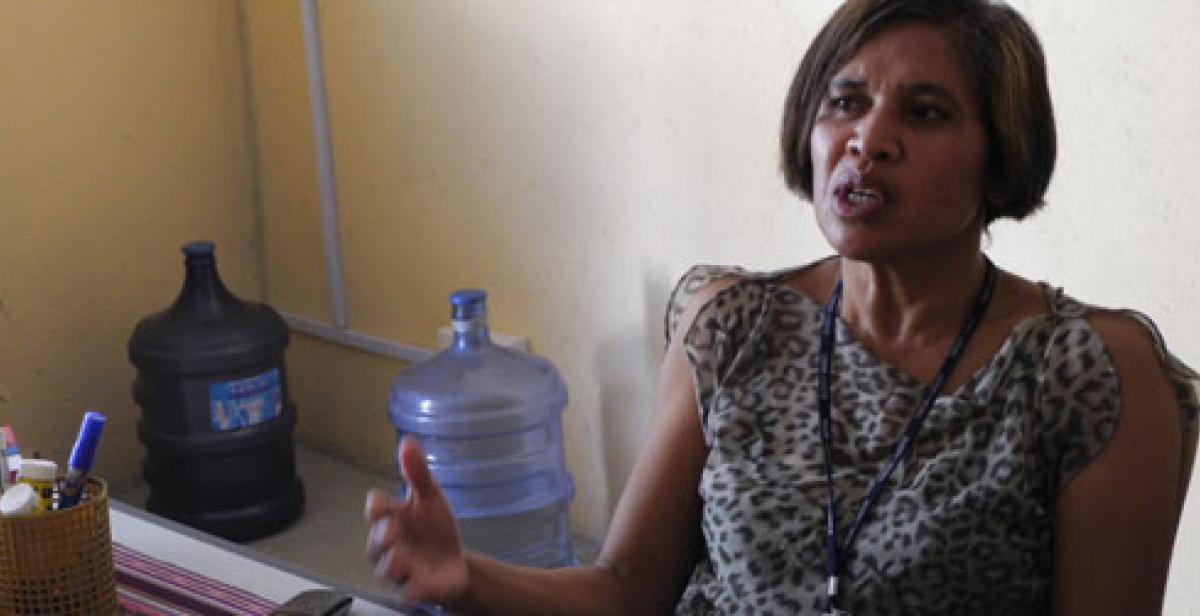"This lady has been here for three months. She is extremely traumatised,” Domingas Tilman (above) who runs a safe-house for victims of domestic abuse in Baucau, Timor-Leste, says of her only current resident. “When she was younger her family forced her to marry a man she didn't like and he was very cruel to her. She ran away twice, losing a new born baby she took with her as a result of homelessness.” This woman is not alone in her situation because, as Domingas explains, “Women are still scared of coming forward and speaking out against their husbands; some communities and families will actively discourage it.”
“Unless there is a real change in attitude and beliefs at the core of all our societies, there will be little progress on the elimination of violence against women,” says Lizzette Robleto-Gonzalez, Progressio’s Policy and Advocacy Officer for Governance and the Environment, ahead of the UN’s international day for the elimination of violence against women, this Sunday (25 November).
Ineffective legislation
Women living in fragile states and post-conflict societies are particularly vulnerable to violence because their countries are still socially and politically unstable, lacking appropriate laws and other mechanisms that protect women’s rights. Many countries may practice customary laws that undermine women.
Roughly speaking half of the world’s population are women. Yet, they are still perceived as second class citizen in many societies. In many countries which have laws and mechanisms for ensuring equality these are poorly observed or enforced.
What are we doing to tackle violence against women?
Promoting gender equality and empowering women is crucial to tackling poverty and improving the lives of the world’s poorest people as well as tackling violence against women. Progressio continues to support women and women's groups in many of our projects in the countries where we work .
In Timor-Leste we have supported the expansion and strengthening of Redo Feto, the ‘Women’s Network’, that brings together women’s groups from all over the country. “There have been some small improvements to equality [since independence], such as the law prohibiting domestic violence introduced in 2010,” says Yasinta Lujina the current director of Redo Feto, " but we need to socialise the law through education and helping women bring their cases to court.” The pioneering members of Redo Feto know they face an uphill struggle against a male-dominated society, but they believe whole-heartedly in their cause and are not prepared to see it fail.
In Yemen Progressio is helping to combat economic disadvantages women face by supporting women to earn their own money. Ms Hanan Omar, head of the Half of Society, a women’s-based NGO in Hodeida, Yemen, says, “A big problem is how society views and discriminates against women. Women who choose work outside the home have inferior jobs... Women also suffer from discrimination in which males are given priority in the family and in society.”
In El Salvador women in rural communities have been supported in come together to conquer the barriers to gaining legal status and have embarked on projects to improve their day to day lives. One of the biggest achievements of the Adecomupaz women’s organisation according to one of its founders Amanda Gonzalez, “Is the united front against domestic violence and gender discrimination.” Together these women, who have been regularly abused by the “machismo” culture, have been empowered to change their standards of living and quality of life. Amanda Gonzalez says, “This united front has allowed us to reach our targets of food security, happiness in our homes and education for women.”
Education, education, education
“Educating women and girls is crucial. And, this should be complemented with equal political participation so that women can speak up, make decisions and transform their own societies,” says Lizzette. “Men should also be included in this process. This could help to tackle the problem of violence making it possible for women and men to thrive and become active citizens rather than seemingly opposing forces.”
Whilst we welcome the UN’s campaign to end violence towards women, in realistic terms, funding should also be made available for women so that they can advocate for their own social changes. “Gender should not be a tick box exercise” says Lizzette “It must generate real progress changing people’s perception of women’s role in society”.
The improved education of women, increased gender equality in law and tackling people’s attitudes of violence towards women could give young girls now, especially those growing up in fragile states, the freedom to make choices they do not currently have. It would also mean that Domingas sees fewer women turning up at her safe-house to take refuge from their husbands or families and fewer lives led in fear of the abuse many women around the world currently face.
Photo of Domingas Tilman © Lucy Jenkinson/Progressio



